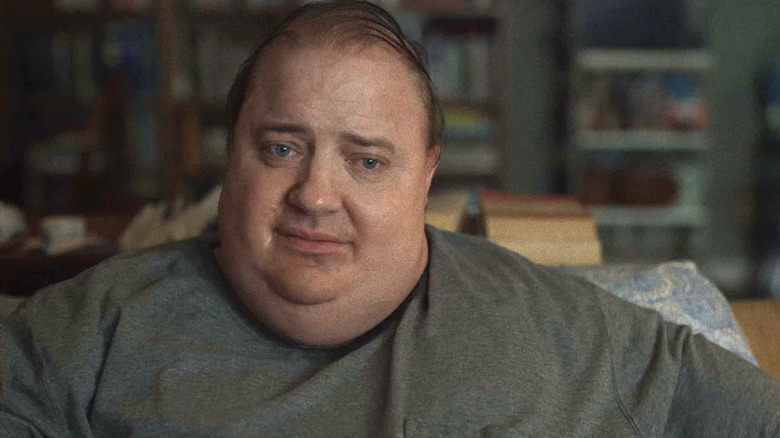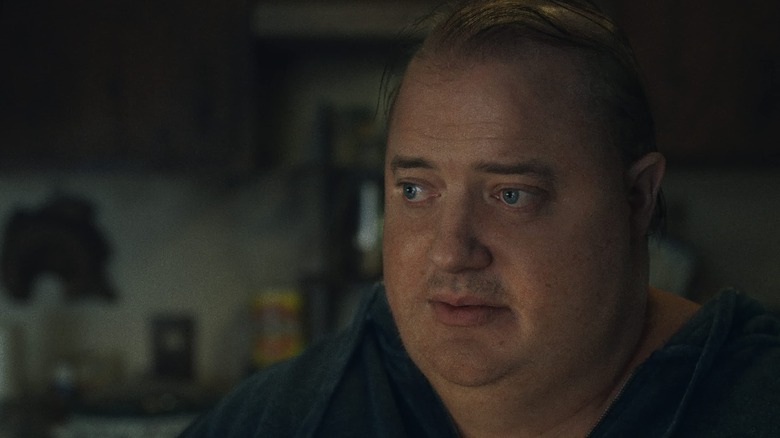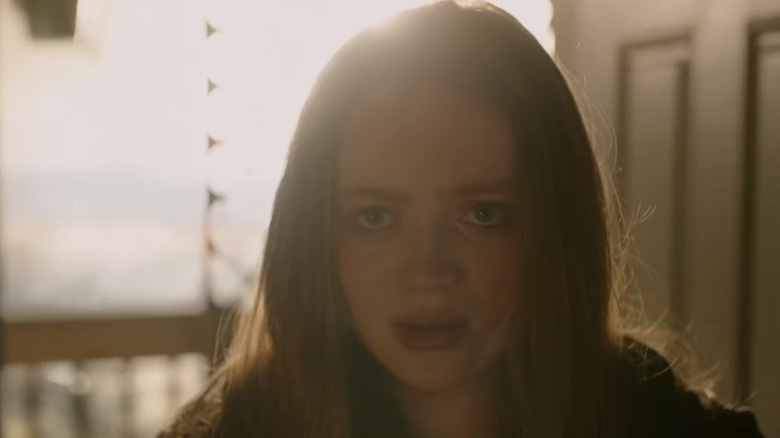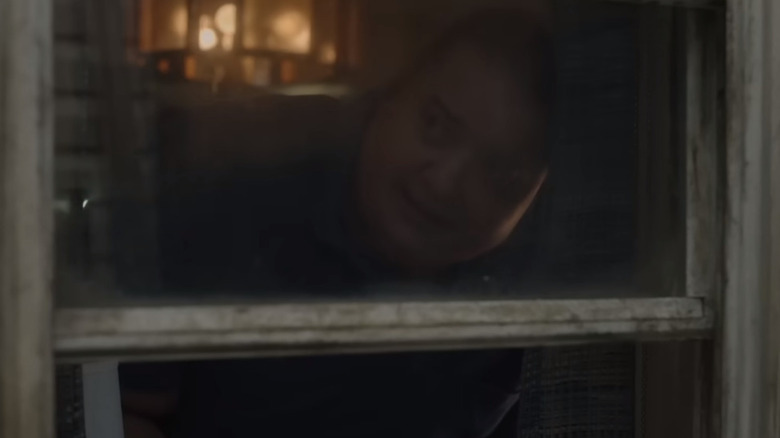The Whale's Darren Aronofsky And Samuel Hunter On Brendan Fraser's Surprising Performance [Exclusive Interview]
Awards season is firmly and inescapably upon us, with a packed field of contenders vying for attention from moviegoers and various voting bodies alike. But the Best Actor race feels to be all but a lock at this point thanks to "The Whale," the latest from A24, which features a career-redefining performance from Brendan Fraser. After months of merely reading about his transformative performance as a 600-pound man, the world at large will finally get to see the film for themselves very soon.
The movie was directed by Darren Aronofsky, of "Black Swan" and "Requiem for a Dream" fame, based on the play by Samuel Hunter. The story centers on a reclusive English teacher (Fraser) who attempts to reconnect with his estranged teenage daughter (Sadie Sink). It's a simple premise, but it provides a showcase for the talents of those in the cast. Aronofsky had been trying to make the film for years, but couldn't land on someone to pull off the lead role. Then, one fateful day, the filmmaker saw a trailer for Fraser's little-seen film "Journey to the End of the Night," and it all clicked into place.
Now, the film feels like a lock for the Oscars, with Fraser the current favorite to win Best Actor. The internet has rallied behind Fraser and the "Brenaissance" that is coming along with it. I recently had the good fortune of not only seeing the movie at the Austin Film Festival, but speaking with both Aronofksy and Hunter following the screening. We discussed how Fraser came to the film, the challenges of adapting the play for the screen, whether or not Aronofksy is ever going to make a big-budget blockbuster, and much more.
This interview has been lightly edited for clarity and brevity.
'When I met him, he clearly had a lot to prove'
It's so good to speak with you guys. Thank you so much for doing this.
Aronofsky: Were you there last night?
I was there last night.
Aronofsky: What'd you think?
I really didn't know what to expect, because as you said, going into it, we didn't know. Because there's no trailer yet. No nothing. I loved it.
Aronofsky: Oh, good.
I had a lot of weird connections to it. In ways I couldn't have known, because I have an estranged gay father.
Aronofsky: Oh, wow.
I know you've had a couple of screenings so far, but how did this compare?
Aronofsky: Well, Austin's a great crowd. Always. They're just movie lovers here, and you could feel that.
Hunter: Yeah.
Aronofsky: There were a lot of writers in the audience. I didn't hear, but a friend who was in the audience was saying, who was also in Toronto, Beth –
Hunter: Oh yeah.
Aronofsky: [She] was saying that there was a lot more laughter.
Hunter: Oh good.
Aronofsky: A lot more of the jokes ranked through even more, which was great. The theater is gorgeous.
The Paramount is beautiful, yeah.
Aronofsky: It's just a remarkable stage to be on. Harry Houdini was on that stage.
Hunter: Yeah.
Aronofsky: Personal hero. It was great. It was fun. It was really fun. And the crowd was great last night.
What about you, Sam? Because you've done a lot of premieres [Darren], a lot of movies. This is, if I'm not mistaken, is this your first feature?
Hunter: My first feature.
So how has this been for you? Because this is more of a new experience for you in this way.
Hunter: It's a really new experience, but I will say, I expected this to be drastically new, completely. But there are some things that theater and film share. I've done press, I've done the red carpets, but this is to an exponential degree, larger. It's been great. I love the theater. I love writing plays. Theater audiences do tend to skew older, and it was just so nice to see so many young people in that audience yesterday. There's students. I just did a panel, and there were a ton of students in the room. It's just been really wonderful.
Aronofsky: That energy's great.
Let's start with the big thing here. Brendan is getting a lot of rightful acclaim for this, and I suspect he's going to be holding an Oscar here in a few months. When you finally saw him and thought, "This is the guy," all due respect, he was not exactly at the top of anyone's mind at the time in Hollywood. Was there pushback when you said, "This is the guy who I want"? Was there pressure to put a larger star in that role?
Aronofsky: Look, I think it's a really small film, and there was a lot of faith from A24. They're definitely a director's company. I think my first meeting, first pitch of it to [A24 co-founder] Dave Fenkel, there wasn't a blink. He was like, "Okay." It was very easy, and I was relieved. I didn't know how he would react. I've said this in front of Brendan. I had no idea about the Brenaissance [laughs] or any of the deep, deep love for the human being that he is. I think I was a little older than the generation that watched those big '90s movies, so I missed a lot of them. I hadn't seen any of the dramatic work. I still haven't seen "Gods and Monsters." I did watch "School Ties" while we were in post.
Oh, no kidding.
Aronofsky: It's like, "Whoa. What the? Matt Damon in a supporting role? The world is insane!" But he fit the bill. When I saw him in that trailer, a light bulb went off. I was like, "I've got to meet him," because I had been thinking for years and years who could do it. I had watched tape on so many actors, famous and non-famous, and nothing ever really made sense to me. But then, I was like, "All right. Let me meet him," because it just felt right. Then, when I met him, he clearly had a lot to prove, and clearly hadn't been given opportunities in a long time.
I think once a star and once a great actor, always a star and a great actor. It's in there. It was just deep in his soul. What that is, it's hard to explain. When I worked with Russell Crowe, I could remember him in a little shot, just doing this little thing with the twitch of a corner of his eye. I had this realization that that's why he's a huge star, because there's someone in some bumf*** place on a corner of the planet who will understand what that emotion was in the same way that sign in the middle of Times Square understands it.
It's that ability to communicate with this instrument that is them. We all can understand it, but some people, it's somehow outside of their body. If you can find that in someone, it's an amazing thing to focus on. Brendan was excited to work. Then, we rolled up our sleeves and got busy. I think he showed me a lot of trust from the beginning, and every day, he continued to surprise me about the places, and the depth, and the corners of his soul that he was willing to give to the audience.
'I knew that was the right choice, but it was also the difficult choice'
Sam, for you, most people are going to discover this as a movie, but it did start as a play. Just because I think a lot of people aren't going to get the chance to see the play, what changed between the stage show and adapting it to a film?
Hunter: Very early on, before we even met for the first time, when I just knew that [Darren] had seen it and wanted to talk to me about it, I just assumed that he would want to do that traditional thing of opening it up, and finding different locations, and following different characters. I was nervous about that. I was, of course, willing to do it because I trust Darren. I was nervous about doing it, because I was like, "This story feels like it so wants to be just with Charlie." Without me saying anything, in one of our early meetings, he was like, "Let's keep it in the apartment." I knew that was the right choice, but it was also the difficult choice.
Aronofsky: It's a huge problem, just cutting to different scenes. We haven't discussed this ever before, but it's always a hard thing to keep people in a room in a play. That's one of the huge challenges of a playwright, I imagine. "Why are these actors all standing in the room together still?" But the fact that one character really doesn't have a physical ability to move too much helps with it.
Hunter: Yeah, exactly. Maybe other plays of mine could probably be opened up in that traditional way, but this one really doesn't want to be. Over many years and many conversations, we just found a more cinematic language. I think it was three, four years ago that the idea of the second bedroom came into play. Because in the play, it's just the living room. But then it was like, "Well, what if there's a second bedroom that is just the archeology of his time with Alan that's been carefully preserved and feels very different from the rest of the apartment?"
I love that, by the way, just the fact that was locked away, and then something forced him to end their world.
Aronofsky: For us, the chase scene of the movie is him trying to get the key.
Hunter: Exactly.
It adds a weird bit of action in the middle of the movie.
Hunter: In the play, Charlie says, "I think I need to call Ellie." But in the film, that's a silent scene that happens, and you see it in Brendan's eyes where he's like...
Aronofsky: Who did he say it to?
Hunter: To Liz, in one of the early Liz scenes. He's like, "I think I need to call Ellie –"
Aronofsky: She was against it.
Hunter: And she was against it. But in the movie, he makes that silent decision after Googling it, and you don't know what it is until, there she is.
Can I ask a really nerdy question that might just be me reading into things that aren't there?
Aronofsky: Of course.
I noticed when you open up the Bible, his name is Alan Grant. Was that a "Jurassic Park" reference accidentally or intentionally?
Aronofsky: Who is Alan Grant?
Alan Grant is Sam Neill's character in "Jurassic Park."
Hunter: Whoops.
Okay. So that was just me reading into it, okay.
Aronofsky: I think that probably happened on set. We were like, "We need a last name."
Hunter: I think somebody was like, "What is his last name?"
Aronofsky: That was the gift of having the writer. You don't have to leave it to the designers and stuff to just go, "Sam, what's his last name?" And then, somewhere in his "Jurassic Park" nightmare memory. That's funny, though.
Just to be clear, "Jurassic Park" is my favorite movie, so I would be the one to notice that. Weirdly connected to that, Ty Simpkins, who was in "Jurassic World," I did not know he was in this. I was delighted, because I think we haven't seen him for a minute. Now, he's like a grown person. But how did he come about? Because I thought he was phenomenal in it. I was really happy to see him.
Aronofsky: I was having a really hard time casting that role. It's actually one of the more difficult roles to play.
Hunter: Yes.
Aronofsky: Maybe just because it's an 18-year-old kid who you have to believe is innocent enough and blocked off in the world to be a true believer without any cynicism, but is also a liar, and has a secret. That's a pretty hard role when you think about the kind of contradictions of every line for any actor, especially a young actor, to figure out how to do. I was struggling with it, and there were a few actors who were in their later 20s that were good. But up against Sadie [Sink], it just felt wrong because there needed to be this romance between them of some type. It just seemed weird for an older [actor]. Also, you'd believe the older kid was young if they weren't next to Sadie by themselves. But when you put him next to Sadie, you go, "That guy's old."
We were dealing with that. Then, two weeks before we shot him, I wasn't cast and my casting director, Mary Vernieu, was like, "I got this one guy. I've been trying to get him on tape." I think Ty was stepping back a little bit. He was at the University of San Diego. He was studying theater, but he needed to take a break. He was going through a "grow-up, leaving the child star behind" [situation] and becoming the man actor that he is now, the grown-up actor. He got on tape. Then, I was like, "Let's get him in the room." He read with Sadie. Then, I think two days later, he was on a plane to Newburgh, New York and just jumped, thrown right into our rehearsals.
Hunter: Yeah. I worked with him a lot, too. There were many days where when you were shooting something, I would go with Ty in the office, and we'd read through the scenes together. He's said this publicly, so I'm not speaking out of turn, but he brings a lot of personal stuff to this world as well. Both Ty and I share a past with our faith, where we were desperately trying to negotiate our faith with the world that we saw in front of our eyes.
Aronofsky: Yeah.
Hunter: Ty brought a lot of that personal stuff to the performance, I think.
'It was like, what's the next Superman?'
Can I ask you something totally off base? I did not know this until recently. Apparently, you were pretty close to directing "Man of Steel?" How close did you get? I had heard you pitched a "Batman" movie. The idea of you doing Batman — interesting. The idea of you doing Superman? To me, like holy s***. How close was it?
Aronofsky: It wasn't close. It was a couple of meetings, and I don't know if it was "Man of Steel" at the time. It was like, what's the next Superman? I was curious, because it's definitely a great assignment to try to figure out how to do that. "Man of Steel" was which one?
That was Zack Snyder's.
Aronofsky: Anyway, so I had a couple of conversations about it. I think it was ... whatever else I was doing in my life showed up.
I know you've come close to a couple of bigger, blockbuster-y things, but you've never really ... I guess "Noah" maybe was the closest.
Aronofsky: That was a blockbuster. The original superheroes [laughs].
But is there one that on your list of ones that you've maybe come close to or ones that you're like, "I would still like to do that," or does blockbuster filmmaking not appeal to you as much?
Aronofsky: Yes. There's something I'd like to do, that I'm trying to do.
What struck me when we sat in the theater and there was, we have no idea what we're seeing, and the curtains are set in such a way. Then, they didn't move. How'd you guys settle on the aspect ratio for the movie?
Aronofsky: Well, it's all in one apartment. The apartment, all respect to my production designers who are brilliant, and it looked great. It's not as interesting as the actors' faces. This film is about performance. It's about the close-up. It's about them, so I wanted the camera to be on them.
"The Whale" arrives in theaters on December 9, 2022.



